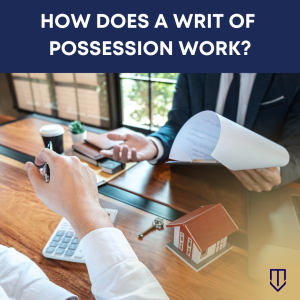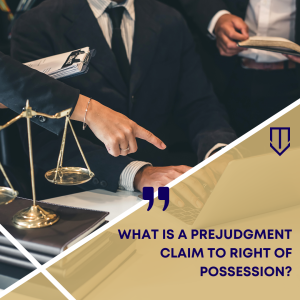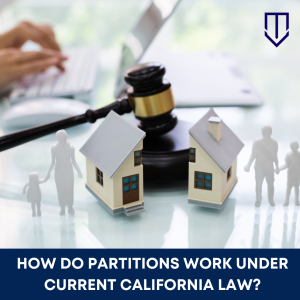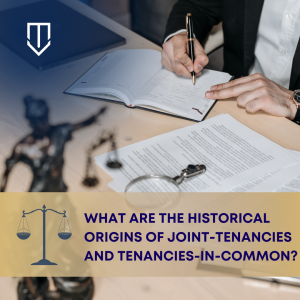 There are two common ways an individual can own property: (1) as a tenant in common or (2) as a joint tenant. In California, there is a presumption that the co-owners of a piece of property are tenants in common unless the deed expressly states that the co-owners are joint tenants.
There are two common ways an individual can own property: (1) as a tenant in common or (2) as a joint tenant. In California, there is a presumption that the co-owners of a piece of property are tenants in common unless the deed expressly states that the co-owners are joint tenants.
In a joint tenancy, there is a right of survivorship, meaning that when one joint tenant dies, the surviving joint tenant inherits the other joint tenant’s interest in the property. There is no right of survivorship in a tenancy in common. In certain circumstances, different rules or laws apply when a property is held in a joint tenancy versus a tenancy in common. For example, there are certain laws for property taxes that apply for a tenancy in common that is different from a joint tenancy.
At the Underwood Law Firm, our attorneys are more than familiar with property taxes and the requirements that follow. This area of law can be complex and entangled in technicalities. Our attorneys are here to walk you through the law step-by-step so that you are not lost in the maze of rules and regulations and to get the best possible results from transferring your property ownership.
 California Partition Law Blog
California Partition Law Blog


 In every property co-owned by two or more persons, there are common costs. Common costs are those costs for the property that are common to all owners or for the common benefit of all owners. In California, cotenants are required to pay for their portion of the common costs. Therefore, cotenants must pay for their share of expenses to operate and maintain the property. The portion of common costs one must pay depends on the ownership interest of that cotenant.
In every property co-owned by two or more persons, there are common costs. Common costs are those costs for the property that are common to all owners or for the common benefit of all owners. In California, cotenants are required to pay for their portion of the common costs. Therefore, cotenants must pay for their share of expenses to operate and maintain the property. The portion of common costs one must pay depends on the ownership interest of that cotenant. “A trust is any arrangement which exists whereby property is transferred with an intention that it be held and administered by the transferee for the benefit of another.” (
“A trust is any arrangement which exists whereby property is transferred with an intention that it be held and administered by the transferee for the benefit of another.” ( Generally, a bankruptcy proceeding acts as a stay on the collection of debt as well as any acts needed to be taken to enforce a debt. The rules regarding
Generally, a bankruptcy proceeding acts as a stay on the collection of debt as well as any acts needed to be taken to enforce a debt. The rules regarding  A Prejudgment Claim to Right of Possession is a form used for the purpose of avoiding third-party claims in an eviction/unlawful detainer action. The Prejudgment Claim to Right Possession is for the purpose of giving notice to any unnamed occupants of a subject property that an eviction action has been initiated. After a prejudgment claim to right of possession, any unnamed occupants may file their own prejudgment claim form to preserve their rights in the subject property. If said unnamed occupants fail to do so, those unnamed occupants will lose their rights in the subject property, and the eviction action may proceed.
A Prejudgment Claim to Right of Possession is a form used for the purpose of avoiding third-party claims in an eviction/unlawful detainer action. The Prejudgment Claim to Right Possession is for the purpose of giving notice to any unnamed occupants of a subject property that an eviction action has been initiated. After a prejudgment claim to right of possession, any unnamed occupants may file their own prejudgment claim form to preserve their rights in the subject property. If said unnamed occupants fail to do so, those unnamed occupants will lose their rights in the subject property, and the eviction action may proceed.  Co-ownership of property brings with it many rights and duties under the law. These rights and duties can vary depending on whether co-owners hold property as
Co-ownership of property brings with it many rights and duties under the law. These rights and duties can vary depending on whether co-owners hold property as  The Partition of Real Property Act (PRPA) is an exciting new development in
The Partition of Real Property Act (PRPA) is an exciting new development in  American law has its roots in the laws of England. As such, many of the laws still on the books in the 21st Century depend on what English judges thought prior to our War for Independence began in 1776. Because our modern laws go back centuries since before the United States was a country, we should care about how our legal terms were originally understood as they may implicate a judge’s decision today. The most important of all the English Judges who influenced our modern laws was most likely Sir William Blackstone.
American law has its roots in the laws of England. As such, many of the laws still on the books in the 21st Century depend on what English judges thought prior to our War for Independence began in 1776. Because our modern laws go back centuries since before the United States was a country, we should care about how our legal terms were originally understood as they may implicate a judge’s decision today. The most important of all the English Judges who influenced our modern laws was most likely Sir William Blackstone.  Yes. When co-owners of property decide they want to go their separate ways but cannot come to an agreement on a buyout or reimbursements, they can institute a partition action and have the court system solve the problem for them.
Yes. When co-owners of property decide they want to go their separate ways but cannot come to an agreement on a buyout or reimbursements, they can institute a partition action and have the court system solve the problem for them.  A “waste” claim is a means of recovering damages when a tenant on real property does substantial damage to the property itself. Most often, a waste claim arises when a person renting property causes damage while living there. But a waste claim isn’t restricted to landlords and tenants. It applies to nearly all situations where two or more people have some sort of interest in the common property.
A “waste” claim is a means of recovering damages when a tenant on real property does substantial damage to the property itself. Most often, a waste claim arises when a person renting property causes damage while living there. But a waste claim isn’t restricted to landlords and tenants. It applies to nearly all situations where two or more people have some sort of interest in the common property.